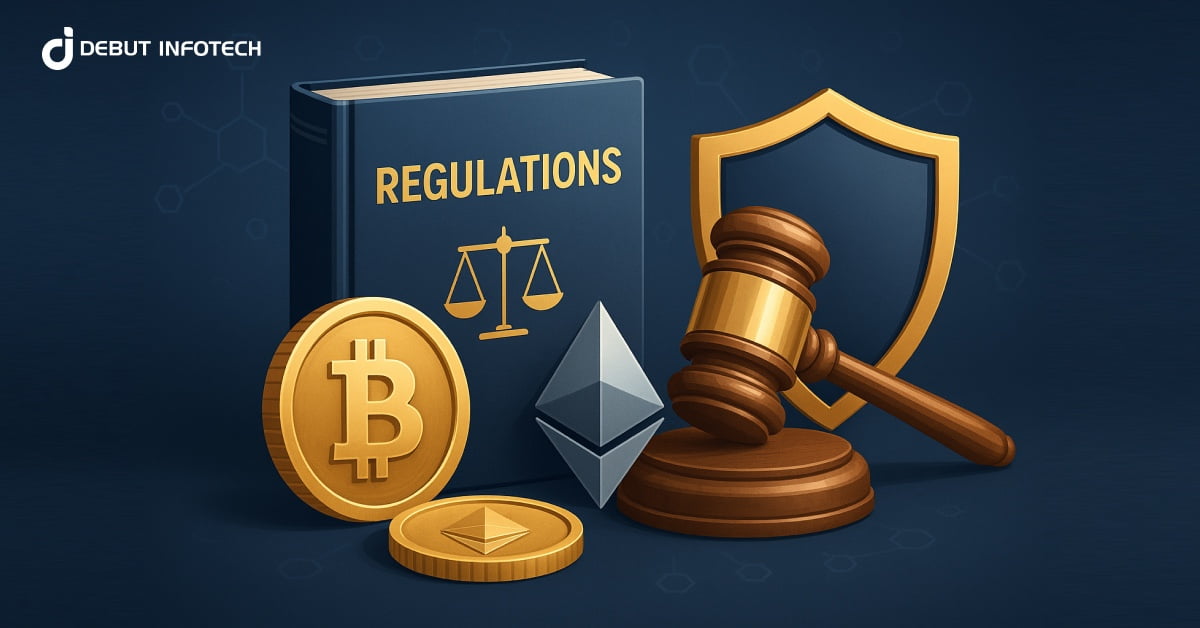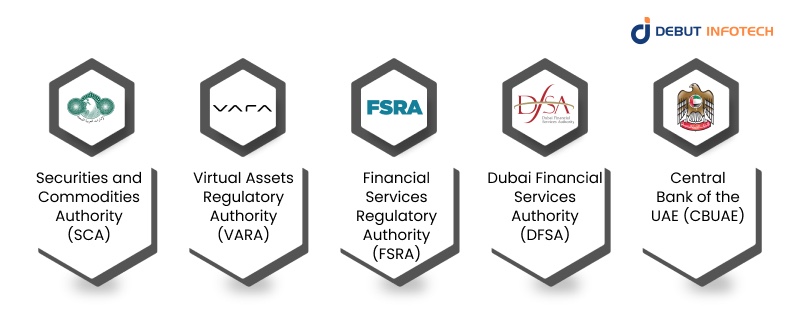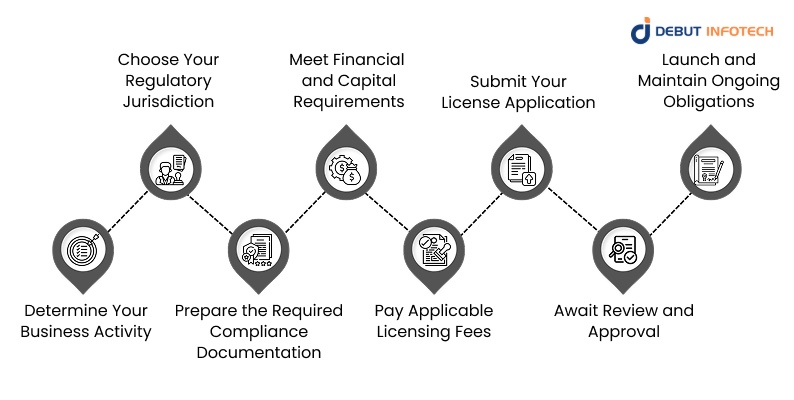Table of Contents
Home / Blog / Cryptocurrency
Crypto Regulations in the UAE: Licensing, Compliance, and Key Updates for 2025
October 28, 2025

October 28, 2025
UAE crypto regulations have turned the country into one of the most advanced jurisdictions for digital assets. With the government’s commitment to innovation and financial transparency, the UAE has established a robust legal framework to attract global cryptocurrency players. According to Chainalysis, the UAE ranked among the top 20 countries worldwide for crypto adoption in 2024, reflecting its growing investor confidence.
Another report suggests that over 25% of UAE residents now hold some form of cryptocurrency in 2025, with adoption surging by 210 % year-on-year.
In this guide, we will look at the structure of the UAE’s crypto regulations, covering central authorities, free zones, compliance requirements, licensing procedures, and what to expect in 2025 as the industry matures.
Develop Regulation-First Crypto Platforms
We build blockchain systems with built-in compliance modules tailored to UAE crypto regulations, reducing audit risks and downtime.
What are Regulatory Authorities in the UAE?
Regulatory authorities are public bodies that set rules, grant licences, supervise compliance, and enforce penalties in specific sectors. In the UAE crypto context, responsibilities are split among federal regulators, emirate-level regulators, and financial free-zone regulators — each with defined territorial or functional jurisdiction. This multi-layered approach aims to combine investor protection with flexible hubs for innovation.
Key Regulatory Authorities in the UAE

The core crypto authorities in the UAE are:
1. Securities and Commodities Authority (SCA)
The SCA oversees securities markets and supervises crypto assets that qualify as securities or derivatives. It sets licensing rules for token offerings, exchanges, and brokerage activities, ensuring investor protection and market transparency. The SCA also collaborates with VARA and other regulators to align federal and emirate-level oversight.
2. Virtual Assets Regulatory Authority (VARA)
VARA, based in Dubai, governs all virtual asset activities across the emirate (excluding DIFC). It issues operational licenses to exchanges, custodians, and service providers. VARA also publishes detailed rulebooks outlining supervision standards, AML obligations, and technology requirements to ensure safe and responsible digital asset operations within Dubai’s jurisdiction.
3. Financial Services Regulatory Authority (FSRA)
The FSRA, operating under Abu Dhabi Global Market (ADGM), regulates virtual assets through a dedicated framework for exchanges, custodians, and intermediaries. It was one of the first regulators globally to issue a comprehensive rulebook for digital assets. The FSRA emphasizes market integrity, investor protection, and transparent disclosures across licensed entities in its UAE crypto regulation agreement.
4. Dubai Financial Services Authority (DFSA)
The DFSA supervises crypto-related activities within the Dubai International Financial Centre (DIFC). Its framework covers tokenized securities, stablecoins, and investment tokens, ensuring alignment with international standards. DFSA licenses trading platforms, fund managers, and advisory firms, providing legal clarity and investor safeguards in Dubai’s common-law financial ecosystem.
5. Central Bank of the UAE (CBUAE)
The CBUAE regulates payment systems (I.e, crypto payment gateway), stablecoins, and the issuance of digital payment tokens. It enforces AML/CFT compliance, cybersecurity protocols, and financial stability requirements for licensed institutions. The Central Bank also leads national initiatives, such as the Digital Dirham project, to modernize payment infrastructure and support financial innovation.
What are Crypto-Focused Free Zones?
Free zones are designated economic areas where companies benefit from specialized regulations, operational flexibility, and tax incentives. For crypto Dubai businesses, the most relevant free zones are ADGM (Abu Dhabi), DIFC (Dubai), and RAK DAO (Ras Al Khaimah). These jurisdictions provide bespoke legal frameworks and dedicated supervision tailored to virtual asset activity, and they are often the preferred route for exchanges, custodians, and token issuers seeking international-grade compliance.
Key Crypto-Focused Free Zones in the UAE
1. Abu Dhabi Global Market (ADGM)
ADGM offers a highly structured legal and regulatory environment for virtual asset service providers. The FSRA grants licenses to exchanges, custodians, and token issuers. ADGM’s clear rulebook, combined with its robust financial ecosystem, attracts global blockchain firms seeking a trusted jurisdiction for digital asset operations.
2. Dubai International Financial Centre (DIFC)
DIFC, governed by the DFSA, provides a globally recognized common-law framework for digital asset businesses. It focuses on tokenized securities, crypto investment products, and fintech innovation. The DIFC’s independent courts, strong financial infrastructure, and established compliance standards make it a preferred hub for institutional crypto ventures.
3. RAK Digital Assets Oasis (RAK DAO)
RAK DAO, launched in Ras Al Khaimah, focuses on supporting blockchain startups, Web3 developers, and token projects. It offers simplified licensing, flexible corporate structures, and dedicated support for digital entrepreneurs. RAK DAO positions itself as an innovation-driven free zone designed for early-stage blockchain companies and digital asset creators.
UAE Authorities Regulating Virtual Assets and Crypto Markets And Their Requirements
1. Abu Dhabi Global Market (ADGM / FSRA)
The FSRA governs digital asset activities through its comprehensive Virtual Asset Framework. Licensees must comply with capital requirements, AML/KYC obligations, governance standards, and custody rules. The FSRA also monitors trading conduct, market surveillance, and consumer disclosures to maintain integrity and protect investors within ADGM’s international financial ecosystem.
2. Virtual Assets Regulatory Authority (VARA)
VARA supervises Dubai’s virtual asset market and issues licenses for activities such as trading, custody, and token issuance. Its rulebooks specify operational, cybersecurity, and AML standards. Firms must register under defined activity categories and follow stringent disclosure and reporting protocols, ensuring Dubai’s digital asset ecosystem remains transparent and secure.
3. Securities and Commodities Authority (SCA)
The SCA regulates securities and investment tokens under federal law. Entities offering tokenized securities, derivatives, or digital investment products must obtain SCA approval and comply with AML, transparency, and corporate governance standards. The SCA also coordinates with VARA and other regulators to align virtual asset regulation across the UAE.
4. Central Bank of the UAE (CBUAE)
The Central Bank focuses on virtual assets functioning as payment instruments or stablecoins. Licensed entities must adhere to risk management, cybersecurity, and AML frameworks. It also issues guidance on tokenized payments and unlicensed VASPs while advancing its Digital Dirham initiative to strengthen the UAE’s payment ecosystem.
Compliance Requirements for Crypto Companies in the UAE
1. KYC (Know Your Customer)
KYC processes, mandated by the SCA, VARA, FSRA, and the CBUAE, require identity verification, customer risk profiling, and ongoing due diligence. For regulated crypto exchanges in UAE and custodians, strong KYC controls prevent illicit transactions and enhance user trust. Regulators assess onboarding and monitoring systems before approving virtual asset licenses.
2. AML (Anti-Money Laundering)
AML obligations fall under Federal Decree-Law No. 20 of 2018 and apply to all crypto-related entities licensed by VARA, FSRA, and SCA. Firms must maintain AML programs, conduct regular audits, and file suspicious activity reports. Proper AML compliance protects market integrity and ensures alignment with FATF recommendations.
3. Transaction Monitoring
Transaction monitoring is critical for detecting unusual activity and maintaining transparency. Licensed entities under ADGM, VARA, and the Central Bank must implement automated systems to flag high-risk transactions. These systems support AML objectives, enable traceability across blockchain networks, and help prevent fraud, market abuse, and terrorist financing.
4. Cybersecurity Standards
All regulators — FSRA, DFSA, VARA, and CBUAE — enforce cybersecurity frameworks that require encryption, incident response, and third-party risk management. Top crypto companies must safeguard digital wallets, private keys, and user data from breaches. Strong cybersecurity compliance reassures investors and strengthens operational resilience across the UAE crypto market.
5. Licensing Compliance
Licensing compliance involves adhering strictly to authorized activities defined by regulators like VARA, SCA, and FSRA for cryptocurrency of Dubai. Firms must operate within their approved scope — for instance, custodians cannot offer trading without an additional license. Continuous supervision, reporting, and renewal requirements ensure accountability and maintain regulatory confidence in the market.
How to Get a Crypto License in the UAE

Step 1: Determine Your Business Activity
Clearly define your crypto operations — such as exchange, custody, issuance, or brokerage — as regulators base their requirements on the activity type. ADGM and VARA require precise descriptions in business plans. Accurate classification streamlines licensing, prevents jurisdictional conflicts, and ensures the chosen license aligns with long-term operational and compliance goals.
Step 2: Choose Your Regulatory Jurisdiction
Select a regulator that fits your business model. ADGM’s FSRA suits institutional exchanges, VARA covers Dubai operations, and RAK DAO fits startups. Jurisdictional choice impacts the scope of compliance, capital obligations, and reporting requirements. Engaging local advisors helps match regulatory expectations with your service model from the outset.
Step 3: Prepare the Required Compliance Documentation
Prepare detailed compliance documentation, including AML/KYC policies, cybersecurity protocols, governance frameworks, and financial projections. Regulators, such as VARA and FSRA, require proof of internal controls and risk management systems. Well-structured documentation speeds application reviews and demonstrates operational readiness to meet the UAE’s evolving crypto compliance standards.
Step 4: Meet Financial and Capital Requirements
Regulators impose capital and liquidity thresholds based on business type. For example, ADGM and VARA require higher reserves for exchanges than white label crypto wallet providers. Proof of funds, audited statements, and solvency ratios are mandatory. Meeting these standards signals operational stability and builds regulator and investor confidence.
Step 5: Pay Applicable Licensing Fees
Licensing fees vary across jurisdictions and depend on the license category. ADGM and VARA publish fee schedules that include application, supervision, and renewal costs. Timely payment of fees, along with maintaining good financial standing, helps avoid delays and ensures regulatory continuity throughout the licensing process.
Step 6: Submit Your License Application
Submit your application through the designated regulatory portal. Include all supporting documents and disclosures about shareholders, directors, and compliance officers. VARA and FSRA may request interviews or additional clarifications. A complete, transparent submission accelerates review timelines and strengthens the applicant’s credibility with regulatory authorities.
Step 7: Await Review and Approval
Once submitted, the regulator conducts a thorough assessment of governance, compliance, and capital adequacy. ADGM, VARA, and SCA issue conditional approvals before final authorization. Applicants must meet all requirements before operations commence. Maintaining open communication during this stage ensures smoother approval and stronger relationships with regulators.
Step 8: Launch and Maintain Ongoing Obligations
After licensing, companies are required to file regular compliance reports, audit results, and updates on suspicious transactions. VARA, FSRA, and CBUAE monitor operational integrity and adherence to AML standards. Ongoing compliance ensures the long-term validity of licenses, protects customers, and fosters sustained trust in the UAE’s digital asset market.
Taxation of Cryptocurrencies in the UAE
The UAE remains tax-competitive. Personal income tax does not apply to most crypto holders, and corporate tax policy offers incentives in many free zones; however, a federal corporate tax regime (9% for taxable profits above a threshold) applies in mainland jurisdictions.
Free-zone entities that meet substance and regulatory criteria may retain preferential tax treatment. Firms should obtain tailored tax advice, as crypto activities can trigger different tax treatments depending on their structure and location.
Common Mistakes to Avoid
1. Submitting Incomplete Documentation
Many applications are rejected because key documents — such as compliance manuals, capital proofs, or shareholder disclosures — are missing or inconsistent for a crypto license in UAE. Regulators, such as VARA and FSRA, require complete submissions with supporting evidence. Incomplete filings raise red flags, delay reviews, and indicate a lack of readiness to operate within the UAE’s regulated crypto environment.
2. Failure to Meet Compliance Standards
Some firms underestimate AML, KYC, and cybersecurity obligations. Regulators impose strict frameworks aligned with the FATF standards, and non-compliance can result in penalties or the suspension of a license. Businesses must establish internal controls, provide employee training, and implement monitoring tools before launching their products or services. Failing to comply with requirements jeopardizes credibility and long-term regulatory approval.
3. Choosing the Wrong Jurisdictional License
Selecting a license that does not accurately reflect your actual activities can result in operational restrictions or regulatory breaches. For example, holding a DIFC license while serving Dubai mainland clients violates VARA’s territorial scope. Companies must assess whether their services fall under federal, emirate, or free zone jurisdiction before finalizing their license applications.
Practical Tips for a Smoother Application
1. Conduct a Pre-Application Gap Assessment
Review your company’s structure, risk controls, and governance model against your chosen regulator’s rulebook. This self-assessment identifies deficiencies early, enabling faster corrections and stronger application readiness. Using official FSRA or VARA guidelines helps align documentation with expectations before formal submission.
2. Appoint Qualified Compliance Leadership
Regulators require each licensed crypto firm or crypto development company to designate a Money Laundering Reporting Officer (MLRO) and compliance lead. Hiring experienced professionals ensures regulatory communication is accurate and timely. A capable compliance team demonstrates operational maturity and helps maintain long-term adherence to UAE financial laws and the UAE’s new crypto payment regulations.
3. Engage Local Legal and Advisory Experts
Partnering with UAE-based legal advisors streamlines the licensing journey. Local experts understand regulator preferences, documentation nuances, and fee structures. Their guidance minimizes administrative errors and prevents misalignment with jurisdictional requirements. Legal advisors also assist with banking introductions and ensure that corporate structures comply with UAE ownership regulations. (49 words)
4. Maintain Transparent Communication with Regulators
Maintain an open dialogue with your assigned regulatory contact throughout the review stages. Promptly responding to queries or document requests prevents unnecessary delays. Transparency demonstrates professionalism and builds trust, which often translates into smoother approval and stronger long-term regulatory relationships for your crypto business.
Outlook and Key 2025 Developments to Watch
1. Harmonization of Virtual Asset Regulations Across Jurisdictions
In 2025, federal and emirate regulators — including VARA, SCA, FSRA, and the Central Bank — are expected to strengthen coordination. This alignment aims to remove overlaps between free zones and mainland oversight. Businesses will benefit from clearer licensing pathways and unified compliance standards across the UAE’s growing crypto ecosystem.
2. Expansion of Stablecoin and Payment Token Rules
The Central Bank plans to issue new guidance for stablecoins and payment tokens to ensure transparency and consumer protection. These updates will clarify licensing for issuers and centralized and decentralized wallet providers. Firms dealing with stablecoins should prepare enhanced disclosure frameworks and risk management systems that are aligned with the forthcoming CBUAE requirements.
3. Increased Supervision and Cybersecurity Audits
Regulators are expected to intensify supervision of crypto entities through technology-driven audits and mandatory cybersecurity testing. VARA and FSRA are likely to expand their oversight of data security, transaction monitoring, and custody solutions. Companies that adopt proactive risk management and security frameworks will find compliance audits smoother and faster.
Partner with Blockchain Compliance Experts
We help crypto businesses launch, scale, and operate under UAE regulations through secure, regulation-ready blockchain development.
Conclusion
UAE crypto regulations require a clear business model, careful selection of jurisdiction, and sustained compliance. Firms must align activities with the relevant regulator (ADGM/FSRA, VARA, SCA, or CBUAE), document AML/KYC measures, meet capital and cybersecurity standards, and maintain transparent reporting.
Securing the right licence opens access to UAE markets and free-zone advantages, but ongoing oversight demands operational discipline. For firms ready to invest in compliance and governance, the UAE offers regulatory certainty and commercial opportunity in 2025.
FAQs
Q. Does the UAE allow cryptocurrency?
A. Yes, the UAE allows cryptocurrency trading and investment. It’s legal under strict regulations set by authorities like VARA and ADGM. These frameworks ensure traders and exchanges operate transparently, protecting investors and preventing illegal activity. The country’s goal is to become a global hub for digital assets.
Q. Do I need a license to trade crypto in the UAE?
A. If you’re trading personally, you don’t need a license. But if you’re running an exchange, brokerage, or offering crypto-related services, a license is mandatory. The type depends on where you operate—Dubai (VARA), Abu Dhabi (ADGM), or nationwide under the Securities and Commodities Authority.
Q. Is UAE tax removed from crypto?
A. Yes, the UAE doesn’t impose personal income tax, which includes crypto gains. That means profits from trading or investing in digital assets aren’t taxed. However, licensed businesses offering cryptocurrency services may still incur compliance costs, depending on their structure and operational setup.
Q. Why do crypto traders move to Dubai?
A. Crypto traders are moving to Dubai for its zero income tax, clear cryptocurrency regulations, and robust financial infrastructure. The government openly supports blockchain innovation, making it easier to establish cryptocurrency businesses. Plus, the city’s lifestyle and international connectivity make it a prime spot for investors.
Q. How much is a crypto license in Dubai?
A. The cost of a crypto license in Dubai varies. It typically ranges between AED 30,000 and AED 60,000, depending on the business type and the relevant authority. Additional costs may apply for compliance, office space, and registration. The process is strict but designed to ensure credibility and transparency.
Talk With Our Expert
USA
Debut Infotech Global Services LLC
2102 Linden LN, Palatine, IL 60067
+1-708-515-4004
info@debutinfotech.com
UK
Debut Infotech Pvt Ltd
7 Pound Close, Yarnton, Oxfordshire, OX51QG
+44-770-304-0079
info@debutinfotech.com
Canada
Debut Infotech Pvt Ltd
326 Parkvale Drive, Kitchener, ON N2R1Y7
+1-708-515-4004
info@debutinfotech.com
INDIA
Debut Infotech Pvt Ltd
Sector 101-A, Plot No: I-42, IT City Rd, JLPL Industrial Area, Mohali, PB 140306
9888402396
info@debutinfotech.com



Leave a Comment